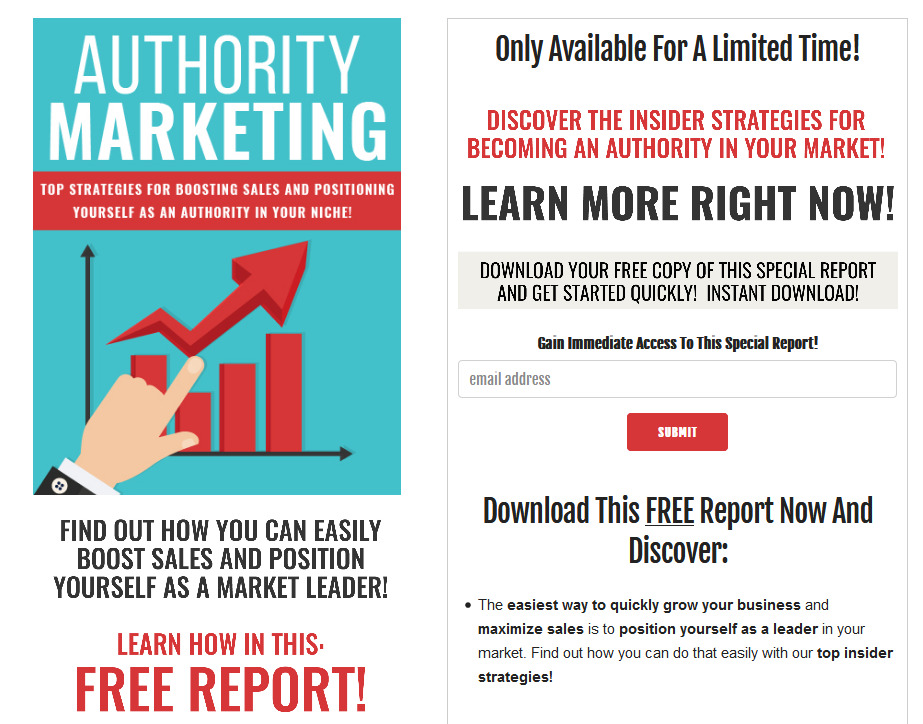Salespage Snapshot

Table of Contents
Table of Contents 3
Introduction 5
Know Your Audience 9
Be Where Your Audience Is 17
Identify Pain Points 21
Share-Worthy Content 24
Join ProfNet or HARO 29
Create an Authority Blog 34
Create Webinars & Training 38
Create an Online Course 42
Resources 48
Sample Content Preview
And your marketing campaigns will be far more successful and ultimately, cost you less in terms of time spent tweaking and split-testing campaigns. Because you’ll know what makes people tick.
If you already have active marketing campaigns in your niche, take a good look at your campaigns from their side of things. Be objective and see if it truly answers their questions and addresses their main goals, fears or concerns.
Are your ads mainly geared towards highlighting features rather than the benefits?
Are your campaigns structured in a way that personally connects with your core audience and goes to work at solidifying your brand?
Do they help position you as an expert?
When it comes to the psychology behind successful brand building and authority positioning, it often hinges on your ability to demonstrate empathy.
The more you do this, the easier it will be to resonate with your audience and connect with your customer base. You’ll come off as more personable, approachable and as someone who truly has their best interests at heart.
There are 3 basic types of empathy: cognitive, emotional, and compassionate.
Cognitive empathy is also known as perspective-taking. It’s the ability to think the way someone else thinks, to imagine you’re them and see how they’d react to something.
It’s a useful skill, especially in marketing, but not exactly what you imagine true empathy should be. Empathy should have an emotional component if it’s going to go the distance.
Emotional empathy is when you inject emotional triggers into your campaigns, ads, sales copy and general content.
How do your customers feel when they look at your ads or read your content? What emotions do you stimulate with your communications, campaigns, emails?
Emotional empathy allows you to feel what others do, like when you hear someone laughing and you smile without knowing exactly what they’re laughing at.
It’s contagious. And when you learn to inject this kind of emotion into your overall brand, your ability to connect with your audience will become one of your super powers.
Finally, compassionate empathy is the ability to identify someone’s emotion and act on that with a solution.
In this way, you’ll create something that not only takes their feelings into account, but gives them a logical solution to that emotion.
Example: Someone is stressed out because they’re unable to pay their monthly bills. You understand their concerns, what keeps them up at night and act on that with a solution: a business opportunity that will help them gain financial freedom and eliminate stress.
Stress is the emotion you identify and your business positions itself in such a way as to become the solution to eliminating or addressing that emotion.
And it doesn’t have to be a negative emotion either. Someone could feel elated that they have discovered that blogging is a great way to connect with people and help them but they need to know how to create that blog, launch that blog and grow that blog.
The emotion is excitement and happiness. Your solution is to demonstrate to them just how happier they’ll be when they are not only able to share their content with the world, but with your help, they’ll be able to quickly maximize that exposure.
All of this comes down to knowing your market so you can position yourself as the expert and authority they are looking for.
They’ll feel they need you, that you’re the solution to their problems and that you truly understand how they are feeling and what they need most.
That is how you’ll stand out in your market.
Be Where Your Audience Is
We just talked about the importance of knowing your audience through market research so that you can position yourself in a way that people relate to, resonate with and believe in.
The next step is to be where your market spends most their time.
Creating your own forum or message board is great, but it’s always easier to connect with people within the social platforms and websites they are already familiar with and actively use.
What one social media platform is most commonly used by your core audience?
When conducting research for one of my markets, I discovered that most of my younger customers spend more time on Twitter or Instagram while the older generation seems to prefer Facebook.
You might even find that your ideal customer likes some other platform entirely, like Pinterest, Reddit or YouTube.
The point is: do your research and find out where they are spending their time online. Then join the discussion!
Set up accounts on these platforms and create a content plan that stays true to your brand. Don’t confuse your business brand with your personal life, either. You’ll want a separate account where you’re going to share expert advice and high-quality information that targets specific areas of your niche.
You don’t need family photos or your political views on that platform. Keep it separate and keep it focused!
Also, don’t over extend yourself or you’ll lose your ability to truly connect with your audience through consistent engagement. Instead, choose one or two of the platforms where your customers spend the most time and set yourself up.
Other Details- 1 Ebook (PDF, DOC), 49 Pages
- 7 Part Autoresponder Email Messages (TXT)
- 1 Squeeze Page (HTML)
- Year Released/Circulated: 2020
- File Size: 4,095 KB
License Details:
[YES] Can be sold
[YES] Can be used for personal use
[YES] Can be packaged with other products
[YES] Can modify/change the sales letter
[YES] Can modify/change the main product
[YES] Can modify/change the graphics and ecover
[YES] Can be added into paid membership websites
[YES] Can put your name on the sales letter
[YES] Can be offered as a bonus
[YES] Can be used to build a list
[YES] Can print/publish offline
[YES] Can convey and sell Personal Use Rights
[YES] Can convey and sell Resale Rights
[YES] Can convey and sell Master Resale Rights
[NO] Can be given away for free
[NO] Can be added to free membership websites
[NO] Can convey and sell Private Label Rights














